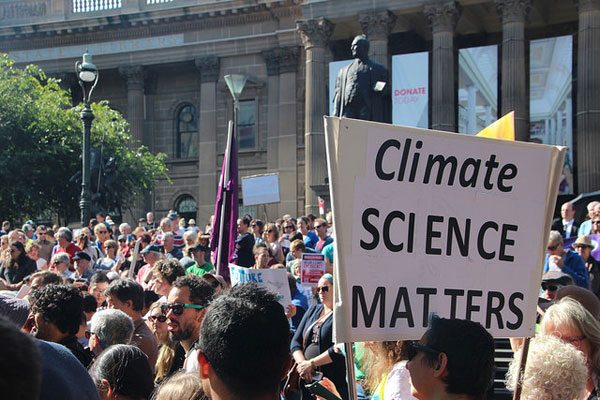
August 13, 2017; The Conversation, Boston Globe, and New York Times
The ongoing debate over climate change within and outside the scientific community may take a new tack if Environmental Protection Agency Secretary Scott Pruitt has his way. Pruitt has called for a “red team-blue team” review to challenge the science that says that climate change is real and a threat to this nation’s future.
In a red team-blue team exercise, the red team attacks something and the blue team defends it. The exercise was originally used in the military to test force-readiness. For-profit security companies then began using it to protect themselves from attacks.
According to people attending the American Association for Clean Coal Electricity, a lobbying group for coal companies, Pruitt indicated that his staff was already at work preparing for a “red team-blue team” exercise to challenge mainstream climate science. This is one of a number of actions by the EPA to undermine the role of scientific research at this agency that is charged with protecting the environment and public health.
As described by the Boston Globe,
The idea is that a “red team” made up of officials from government agencies with responsibilities related to climate would try to poke holes in mainstream climate science, while a similarly constituted “blue team” would have the task of defending the mainstream consensus against this critique. Supposedly, this process would shed new light on what is known and what is not about human influence on the global climate.
Of course, the validity of a “red team-blue team” review is being disputed. Writing for The Conversation, Richard B. Rood, Professor of Space Sciences and Engineering at the University of Michigan, states that from his experience,
I can say confidently that red team-blue team exercises are not a mechanism for scientific debate. They are not designed to take a testable hypothesis and then look at whether observations and theory support or refute it. They are more like Heath Ledger’s Joker in The Dark Night, causing disruption, distortion and chaos.
And so, Pruitt’s call for a red team-blue team review is not designed to test the scientific robustness of our knowledge of climate change. Rather, it is part of the political strategy to continue the dissolution of the EPA’s climate change activities and to destroy President Obama’s efforts to address climate change—something Pruitt and the Trump administration have made their stated goal.
The initial source for this idea may have been Steven Koonin, a physicist at New York University and former undersecretary at the Department of Energy in the Obama administration. Koonin, in an op-ed in the Wall Street Journal, proposed that a “red team” of dissenting scientists be established to critique major scientific reports on climate change with a “blue team” of climate scientists who could then rebut their critiques. Koonin suggests this should be a very public process and “would produce a traceable public record that would allow the public and decision makers a better understanding of certainties and uncertainties.”
Sign up for our free newsletters
Subscribe to NPQ's newsletters to have our top stories delivered directly to your inbox.
By signing up, you agree to our privacy policy and terms of use, and to receive messages from NPQ and our partners.
So, what’s wrong with this process? Plenty, according to an opinion article by three scientists writing in the Washington Post. They state:
Such calls for special teams of investigators are not about honest scientific debate. They are dangerous attempts to elevate the status of minority opinions, and to undercut the legitimacy, objectivity and transparency of existing climate science.
The basic premise of these “Red Team/Blue Team” requests is that climate science is broken and needs to be fixed. The implicit message in the requests is that scientists belong to tribes, and key findings of climate science—such as the existence of a large human-caused warming signal—have not undergone adequate review by all tribes. This tribalism could be addressed, Koonin believes, by emulating Red Team/Blue Team assessment strategies in “intelligence assessments, spacecraft design, and major industrial operations.”
To use present-day vernacular, both Koonin and Pruitt are essentially claiming that peer-review systems are rigged, and that climate scientists are not providing sound scientific information to policymakers.
It is doubtful that the mainstream scientific community that has produced the research on climate science via the rigorous peer-review and scientific inquiry process will want to participate in this proposed red team-blue team process. These scientists worry that Secretary Pruitt’s exercise will elevate and create a platform for marginal views that have already been discredited in the scientific community. There could be doubts raised about the credentials of those who would participate in a process with such dubious goals. As the Washington Post opinion article states:
Even after all the tire kicking, there is strong scientific consensus that planetary-scale warming is now unambiguous, and that human activities are the dominant contribution to this warming.
In short, climate science is not broken. It does not need fixing. We hear similar “broken” arguments about the media, the courts and our democracy itself. We are told that only one team or person can fix the problem; that if we place our trust in that one team, that one person, everything will be fine. In the case of climate science, we choose to place our trust in peer review and in the scientific community—not in teams appointed by Koonin or Pruitt.
The EPA, however, seems determined to move forward with this red team-blue team process and to use it as a platform to further debunk climate change science and advance their own political agenda. As Professor Rood concludes, “Such spectacle will be based on emotional appeal and will rely on manipulating the message about the role that uncertainty plays in scientific investigation. The goal will be the amplification and persistence of public doubt—a goal that would be undoubtedly achieved.”
There is no doubt that the science community will continue to speak out and raise questions about the validity of this kind of exercise. Will their voices be heard? Or will they be undermined by those who would deny that climate change in real?—Carole Levine











